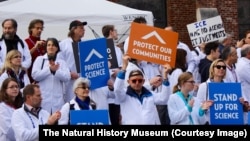A Facebook group promoting a Washington "March for Science" has drawn more than 600,000 followers in just a few days.
Researchers are increasingly stepping into the uncomfortable roles of advocates as early actions from the Trump administration set off alarm bells in the scientific community.
"This is first time in my career I've seen scientists this energized and active," says Chris McEntee, executive director of the American Geophysical Union, the professional society of 60,000 Earth and space scientists.
President Donald Trump has a long Twitter history calling climate change a hoax. His cabinet appointees have questioned the scientific consensus that human activity is the main driver of climate change. His transition team asked for the names of all Department of Energy employees working on the issue, a request the outgoing department chief refused.
Since the inauguration, news reports have described a halt in grants and contracts at the Environmental Protection Agency and a silencing of communications from the EPA, as well as the Department of the Interior and the Department of Agriculture. The EPA's climate change website was reported to be targeted for removal, though it currently remains in place.
In a statement, an EPA spokesperson said a "short pause" in communications is "common practice for any new administration," and said grant-making would resume by Friday.
But many scientists say they are fed up.
"These actions are absurd and cannot be allowed to stand as policy," said the organizers of the March for Science in an emailed statement.
Support for the march "grew far faster than we anticipated," the statement said.
"We have obviously struck a chord," said one of the organizers, Jonathan Max Berman, in a Facebook post as page membership zoomed past a half million.
But it's been a long time coming, said Rush Holt, head of the American Association for the Advancement of Science, the world's largest scientific society.
"In recent decades, ideology has been crowding out evidence," and not just in the climate change debate. The spread of "fake news" is a symptom of "a loss of reverence for evidence," Holt adds. A study by AAAS and the Pew Research Center found a gap in attitudes between scientists and the public on issues from vaccine safety to genetically modified foods and beyond.
AAAS and AGU have both issued statements of concern about the reports of muzzling of government scientists.
"I hope this is just a mistake from inexperience," Holt says. "If this is a trial balloon of a policy to be put in place, then we want to make it clear right from the beginning that it's unacceptable."
"It's just caused a lot of fear and uncertainty about intrusions into scientific integrity," McEntee adds.
Scientists aren't usually protesters, according to Georgia Tech climate scientist Kim Cobb. Cobb was part of an unusual rally for climate science at the AGU meeting in San Francisco last December.
"They want to view themselves as objective information deliverers," not advocates, Cobb says. Plus, some climate researchers who do speak out in defense of their findings have come under withering personal attack.
Organizers made the March for Science Facebook page invitation-only in anticipation of such attacks. That discourages many from speaking up, she adds. But "many scientists are beginning to realize the price that we pay for removing ourselves from this conversation."
No date has been set yet for the March for Science. A separate People's Climate March is scheduled for April 29.




